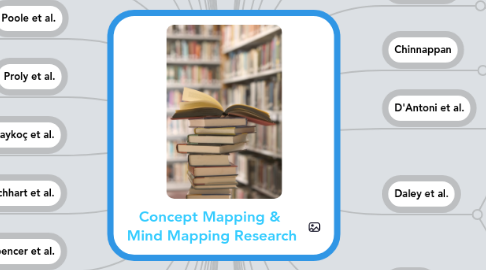Concept Mapping & Mind Mapping Research
by Toni Krasnic


1. Kinchin et al.
1.1. Using Concept Mapping to Enhance the Research Interview (2010)
1.2. A Knowledge Structures Perspective on the Scholarship of Teaching & Learning (2009)
1.3. The myth of the research-led teacher (2003)
2. Laanpere et al.
2.1. Integrating a Concept Mapping Tool into a Virtual Learning Environment: Pedagogical and Technological Challenges (2006)
3. Madu et al.
3.1. Effect of Mind Map as a Note-Taking Approach on Students’ Achievements’ in Economics (2012)
4. Mani
4.1. Effectiveness of digital mind mapping over paper-based mind mapping on students’ academic achievement in Environmental Science (2011)
5. Mento et al.
5.1. Mind Mapping in Executive Education- Applications and Outcomes (1999)
6. Michelini
6.1. Mind map: A new way to teach patients and staff (2006)
7. Miller et al.
7.1. Concept Mapping as a Research Tool to Evaluate Conceptual Change Related to Instructional Methods (2009)
8. Nada et al.
8.1. Mobile knowledge tool-kit to create a paradigm shift in higher education (2009)
8.2. Dynamic Knowledge Management Toolkit (2009)
9. Nesbit et al.
9.1. Learning With Concept and Knowledge Maps- A Meta-Analysis (2006)
10. Nong et al.
10.1. Integrate the Digital Mindmapping into Teaching and Learning Psychology (2009)
11. Novak et al.
11.1. The Theory Underlying Concept Maps and How to Construct and Use Them (2006)
12. Poole et al.
12.1. Concept mapping to measure outcomes in study abroad programs (2006)
13. Proly et al.
13.1. Text Comprehension - Graphic Organizers to the Rescue (2009)
14. Paykoç et al.
14.1. What are the major curriculum issues?: The use of mind mapping as a brainstorming exercise (2004)
15. Ritchhart et al.
15.1. Uncovering students thinking about thinking using concept maps (2008)
16. Spencer et al.
16.1. Radiant Thinking and the Use of the Mind Map in Nurse Practitioner Education (2013)
17. To
17.1. Research on how mind map improves memory (2009)
18. Trifone
18.1. To What Extent can Concept Mapping Motivate Students to Take a More Meaningful Approach to Learning Biology (2006)
19. Tucker et al.
19.1. Profiling a mind map user: a descriptive appraisal (2010)
20. Valadares et al.
20.1. The Teaching Value of Concept Maps (2008)
21. Webber
21.1. Mapping a path to the empowered searcher (2002)
22. Weijze
22.1. Concept Mapping for Concept Engineering (1998)
23. Wheeldon et al.
23.1. Mapping Mixed Methods Research- Methods, Measures, and Meaning (2010)
23.2. Framing experience - Concept maps, mind maps, and data collection in qualitative research (2009)
24. Zampetakis et al.
24.1. Creativity development in engineering education: The case of mind mapping (2007)
25. Zipp et al.
25.1. Mind Maps- Useful Schematic Tool For Organizing And Integrating Concepts Of Complex Patient Care In The Clinic And Classroom (2009)
26. Part of edu curriculum
26.1. Finland
26.2. France
26.3. UK
26.4. Vietnam
27. Seyihoglu
28. Ahlberg et al.
28.1. Practical methods and techniques of knowledge representation in particular those related to concept mapping and mind mapping (2008)
28.2. Varieties of Concept Mapping (2004)
29. Al-Jarf
29.1. Enhancing freshman students’ writing skills with a mind mapping software (2009)
30. Anokhin
30.1. The forming of natural and artificial intelligence (1973)
31. Balim et al.
31.1. Examples of activities prepared by the technologically-supported mind mapping and concept mapping techniques, which are based on the constructivist approach (2008)
32. Beel
32.1. Docear- An Academic Literature Suite for Searching, Organizing and Creating Academic Literature (2011)
32.2. An Exploratory Analysis of Mind Maps (2011)
32.3. Enhancing Information Search by Utilizing Mind Maps (2010)
32.4. Information Retrieval on Mind Maps – What could it be good for (2009)
33. Berry et al.
33.1. Improving Learning through Interventions of Student-Generated Questions and Concept Maps (2008)
34. Brian et al.
34.1. How Do Preservice Teachers Use Concept Maps To Organize Their Curriculum Content Knowledge (1998)
35. Cain
35.1. Using mind maps to raise standards in literacy, improve confidence and encourage positive attitudes towards learning (2002)
36. Canas et al.
36.1. A Summary of Literature Pertaining to the Use of Concept Mapping Techniques and Technologies for Education and Performance Support (2003)
37. Chinnappan
37.1. ICT and pre-service teachers' content knowledge (2003)
38. D'Antoni et al.
38.1. Interrater reliability of the mind map assessment rubric in a cohort of medical students (2009)
39. Daley et al.
39.1. Using Concept Maps in Qualitative Research (2004)
39.2. Integrative Literature Review: Concept Mapping: A Strategy to Support the Development of Practice, Research, and Theory Within Human Resource Development (2010)
40. Davies
40.1. Concept Mapping, Mind Mapping and Argument Mapping: What are the Differences and Do They Matter? (2011)
41. Ellozy et al.
41.1. Making Learning Visible: Using E-maps to Enhance Critical Reading Skills (2010)
42. Evrekli et al.
42.1. Mind mapping applications in special teaching methods courses for science teacher candidates and teacher candidates’ opinions concerning the applications (2009)
42.2. Development of a Scoring System to Assess Mind Maps (2009)
43. Fonseca
43.1. Concept Maps as Tools for Scientific Research in Microbiology (2008)
44. Goodnough et al.
44.1. Mind mapping: A graphic organizer for the pedagogical toolbox (2002)
45. Hay et al.
45.1. Using concept mapping to measure learning quality (2008)
46. Henao-Calad
46.1. Concept maps as a strategy to convert knowledge in knowledge management (2007)
47. Holland et al.
47.1. An investigation into the concept of mind mapping and the use of mind mapping software to support and improve student academic performance (2004)
48. Institute for the Advancement of Research in Education (IARE)
48.1. Graphic Organizers: A Review of Scientifically Based Research (2003)
49. Karpicke et al.
49.1. Retrieval practice produces more learning than elaborative studying with concept mapping (2011)
49.1.1. Mintzes et al.: Comment on Karpicke et al. study
49.1.2. Karpicke et al. response to comment
